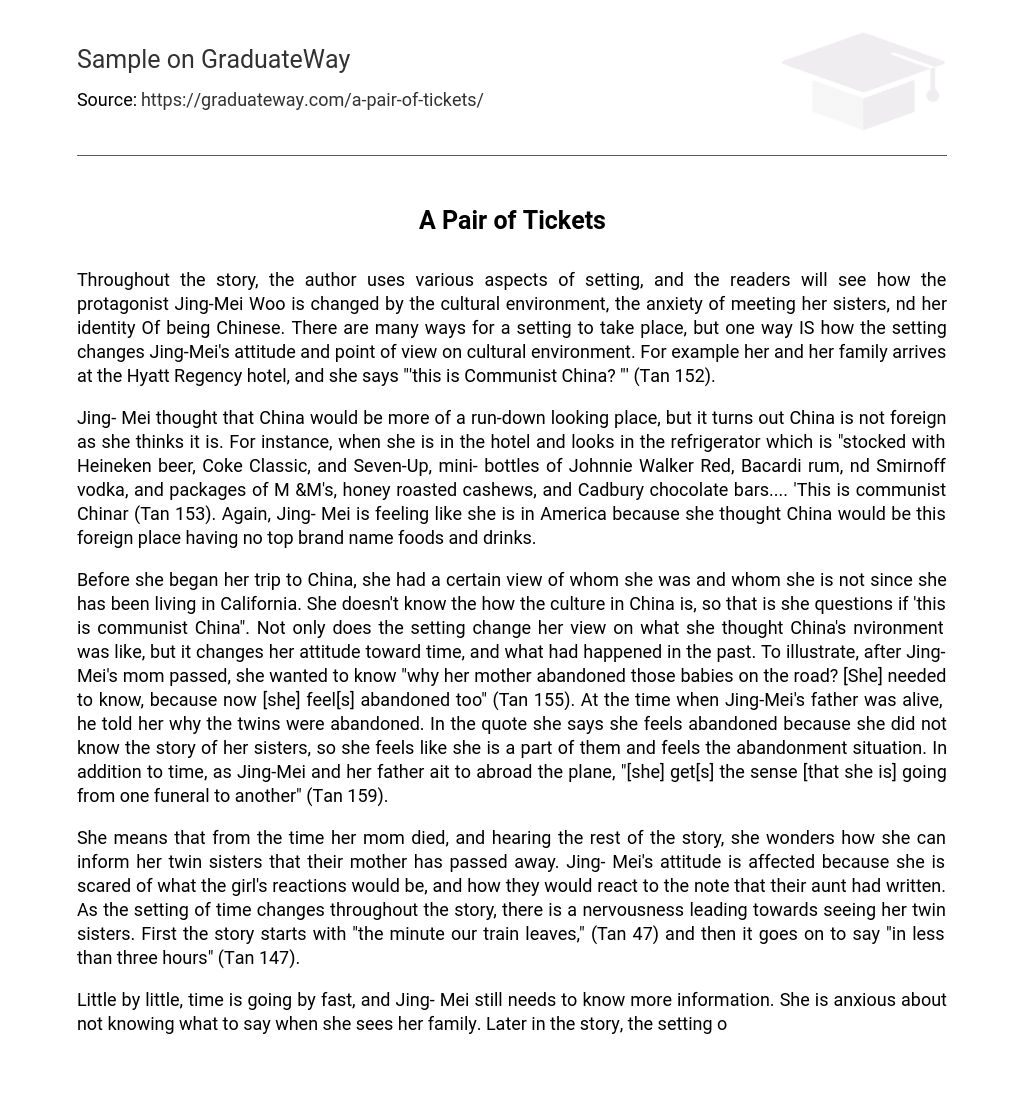Throughout the story, the author uses various aspects of setting, and the readers will see how the protagonist Jing-Mei Woo is changed by the cultural environment, the anxiety of meeting her sisters, nd her identity Of being Chinese. There are many ways for a setting to take place, but one way IS how the setting changes Jing-Mei’s attitude and point of view on cultural environment. For example her and her family arrives at the Hyatt Regency hotel, and she says “‘this is Communist China? “‘ (Tan 152).
Jing- Mei thought that China would be more of a run-down looking place, but it turns out China is not foreign as she thinks it is. For instance, when she is in the hotel and looks in the refrigerator which is “stocked with Heineken beer, Coke Classic, and Seven-Up, mini- bottles of Johnnie Walker Red, Bacardi rum, nd Smirnoff vodka, and packages of M &M’s, honey roasted cashews, and Cadbury chocolate bars…. ‘This is communist Chinar (Tan 153). Again, Jing- Mei is feeling like she is in America because she thought China would be this foreign place having no top brand name foods and drinks.
Before she began her trip to China, she had a certain view of whom she was and whom she is not since she has been living in California. She doesn’t know the how the culture in China is, so that is she questions if ‘this is communist China”. Not only does the setting change her view on what she thought China’s nvironment was like, but it changes her attitude toward time, and what had happened in the past. To illustrate, after Jing- Mei’s mom passed, she wanted to know “why her mother abandoned those babies on the road? [She] needed to know, because now [she] feel[s] abandoned too” (Tan 155). At the time when Jing-Mei’s father was alive, he told her why the twins were abandoned. In the quote she says she feels abandoned because she did not know the story of her sisters, so she feels like she is a part of them and feels the abandonment situation. In addition to time, as Jing-Mei and her father ait to abroad the plane, “[she] get[s] the sense [that she is] going from one funeral to another” (Tan 159).
She means that from the time her mom died, and hearing the rest of the story, she wonders how she can inform her twin sisters that their mother has passed away. Jing- Mei’s attitude is affected because she is scared of what the girl’s reactions would be, and how they would react to the note that their aunt had written. As the setting of time changes throughout the story, there is a nervousness leading towards seeing her twin sisters. First the story starts with “the minute our train leaves,” (Tan 47) and then it goes on to say “in less than three hours” (Tan 147).
Little by little, time is going by fast, and Jing- Mei still needs to know more information. She is anxious about not knowing what to say when she sees her family. Later in the story, the setting of time makes a climax to “one o’clock in the morning’ as she is learning about her mother’s story (Tan 154). It is the next day and she is “at the airport, [and] exhausted [because she] could not sleep last night” (Tan 158). It comes to a closing, and she is terrified of what will happen. She is awakened by her father, “and [she] awake(s) with [her] heart pounding in [her] throat’ (Tan 159).
She gets off the plane expecting something bad, but in the end it turns out to be a happy and peaceful moment. Furthermore, the setting also makes her question her identity of being Chinese. For instance, while she arrived in Guangzhou, she had to go through customs; “[she] wonder[ed] if the customs people will question whether [if she is the] same person in the passport photo…. ” (Tan 150). Because she is wearing make- up in the photo, she says that “even without makeup, [she] could never pass for rue Chinese” (Tan 150).
Jing-Mei is questioning the Way she looks like just from a picture she took in California. Since she is in China, she thinks that the customs people will see her differently with or without makeup. The truth is she is just not quite her about her identity. In the same way, she questions herself of being Chinese when she was fifteen. She states that she ‘Vigorously denied that [she] had any Chinese whatsoever below [her] skin,” but Jing- Mei’s mom says that “once you are born Chinese; you cannot help but feel and think Chinese” (Tan 147).
She questions herself in this quote because she has a bunch of Caucasian friends, and she thinks that hanging out with them changes her in the inside even though she is Chinese on the inside and outside. In addition to her identity and anxiousness of meeting her sisters, the setting comes to a closing of Jing-Mei finds out what it means to be Chinese, and having to release a weight from her shoulders. She gets off the plane, and “as soon as [she got] beyond the gate, [they] run toward each other, all three of [them] embracing, all hesitations and expectations forgotten.
The lace she finally gets to gather with her sisters becomes a moment of relinquishing her fears, “and now [she] also see[s] what part of [her] is Chinese. It is so obvious. It is [her] family/’ (Tan 159). All along, what it meant to be Chinese was right in front of her, but she could not figure it out. She had to go through the past and the future to discover that being Chinese is about family.





